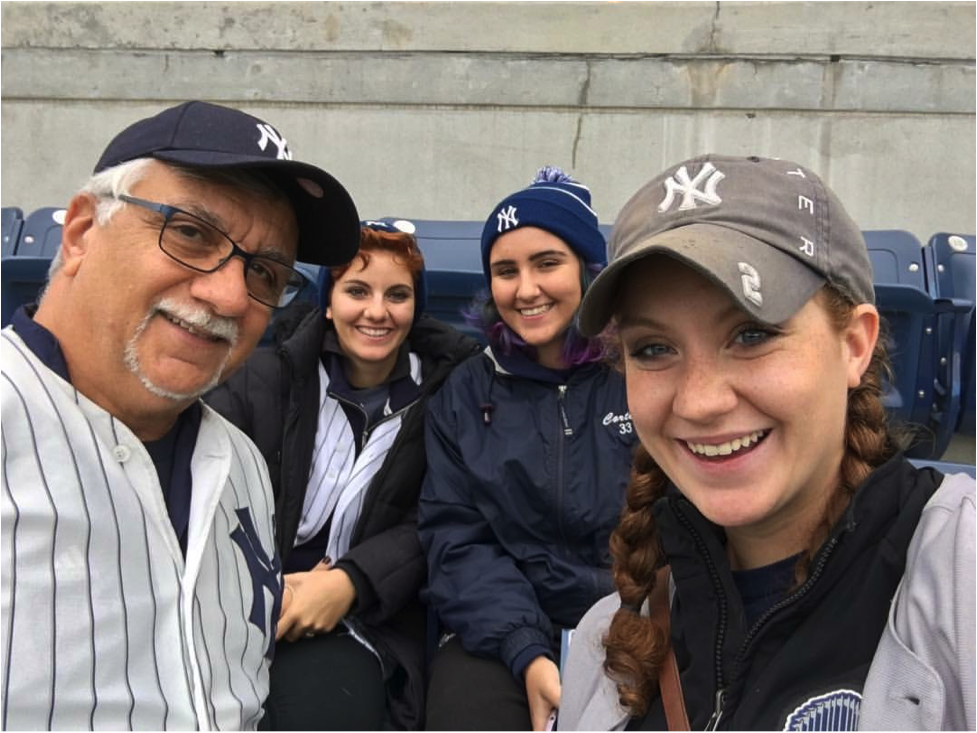Three Daughters and a Dad – a Strat-O-Matic Story
Joe, Julie, Quinn and Brooke Cortese at Yankee Stadium
By Glenn Guzzo
Like a lot of Strat-O-Matic Baseball players, Joe Cortese has a man cave. His Long Island basement is equipped with a TV (tuned to a ballgame, of course), a stereo music player and a place for him to roll dice and keep score. Once in a while, wife Lisa will wander down, look over her shoulder and shake her head. She recognizes that her husband could have worse hobbies … but still.
Unlike most Strat-O-Matic gamers, Cortese’s man cave is where his three daughters learned to love baseball. His daughters are adults now. But each in turn, starting about age 10, would roll the dice with Dad, and learn.
“I think they played primarily because they wanted to do something with Dad. I also saw it as a way to help them with math,” Cortese said.
So, first Brooke Lynn Cortese, now 26, then Julie, now 25, and finally Quinn, now 19, learned about hits and runs and errors and about the Yankees on Dad’s favorite team. They also learned about dice probability from Dad, a self-confessed “stat geek.”
After taking their turns with Dad, they took their turns using Strat-O-Matic to demonstrate their math skills in junior high and high school, for instance blowing up an image of a Derek Jeter card to life-size, then listing the probability of rolling a 7, or a 6 and 8 and so on.
When Cortese shared these stories with Strat-O-Matic creator Hal Richman at the company’s Opening Day this year, Richman was impressed.
“Considering that at best only 2 percent of our players are women, three in one family is amazing.”
The young women are not active Strat gamers now (“but they know when I’m playing downstairs because they can hear those dice,” Dad Cortese says) the love of baseball that Strat-O-Matic helped inspire has accompanied them through life.
All played softball through high school. Brooke Lynn took it farther with a bit of college ball. Then she was a “beat reporter” for the Brooklyn Cyclones minor-league team and, for the last two years, has worked for Major League Baseball in its replay room in New York City. Quinn, now a college freshman, has a personalized batter’s card in her Baseball Express game. After learning at Dad’s knee, Julie is a teacher in Rhode Island.
In a way, like father, like daughter.
“Strat-O-Matic is a huge part of my life,” Joe Cortese says. “I have every baseball product – board and computer – of the past 50 years. I’ve been playing since 1968 and I play every night – almost always cards and dice, the basic game. I work all day in banking, then I come home, and play a couple games a night to relieve the stress. It’s the most relaxing entertainment I could imagine.”
The 63-year-old Cortese has growing mountains of card sets and books of statistics from his game play (“after I’m gone, my wife will have the biggest garage sale ever”), but some of the classic seasons have only been viewed, because his preferred way of play is with the latest cards, playing along with the current season’s schedule.
“I keep all the teams up to date,” he explains. “If the Yankees trade Giancarlo Stanton tomorrow, I will move him to whatever team he’s traded to. I use the nameless players for rookies, and I update them as the season goes on.” For instance, as Shohei Otani’s 2018 season develops, Cortese will change the nameless player he’s using to better reflect Otani’s current stats.
Using all 30 teams but playing only two or three games a night (“maybe 10-15 on weekends”), Cortese knows he has no chance to complete the season. But, like every year, he will play the 2018 schedule precisely and get as far as he can until November.
Then it’s time to anticipate the next Strat-O-Matic Opening Day. He’s missed only one, when he sent wife Lisa in his place to retrieve the new cards on the first day available.
It turns out Lisa is not so dismissive of Joe’s hobby after all.
“Every year on Strat-O-Matic’s Opening Day, she bakes me a cake and writes into the chocolate frosting – it’s always chocolate frosting – `Happy Strat-O-Matic Day.’ ”
Such are the little secrets of long, happy marriages.
“I usually get to the line of Strat-O-Matic players about 11, waiting and talking up the game for a couple hours with the others,” Cortese says. “But this year I was running late and didn’t get there until 2:30 or 3. There was no line, but it gave me the chance to talk to Hal Richman.”
One Opening Day weekend presented a crisis with the women in Cortese’s life. He had to get his niece’s blessing to attend Strat-O-Matic’s 50th Anniversary celebration in New York City on Feb. 11, 2011 – the date of the niece’s wedding.
That wasn’t as relaxing as his basement dice-rolling.
“I went, but to get back in time for the wedding, I couldn’t stay long enough to get my new cards,” Cortese says. “That had to wait until Monday.”
Asked if his game play had provided any memories that could compete with such stories, Cortese didn’t cite a no-hitter (“I’ve had so few”) or a four-homerun game (“I haven’t had one”), but an event from his play in 1973, the first year the American League adopted the designated hitter.
Cortese was playing the 1973 schedule with the 1972-season cards, per his custom, when he recognized that American League pitchers no longer could get injured because they didn’t bat.
“I didn’t think that was fair, so I developed a rule – if the DH rolled a 6-12, then the pitcher was hurt. It turned out to be the same rule that Strat-O-Matic announced the next year. I am super proud of that.”




 Shop Now
Shop Now


